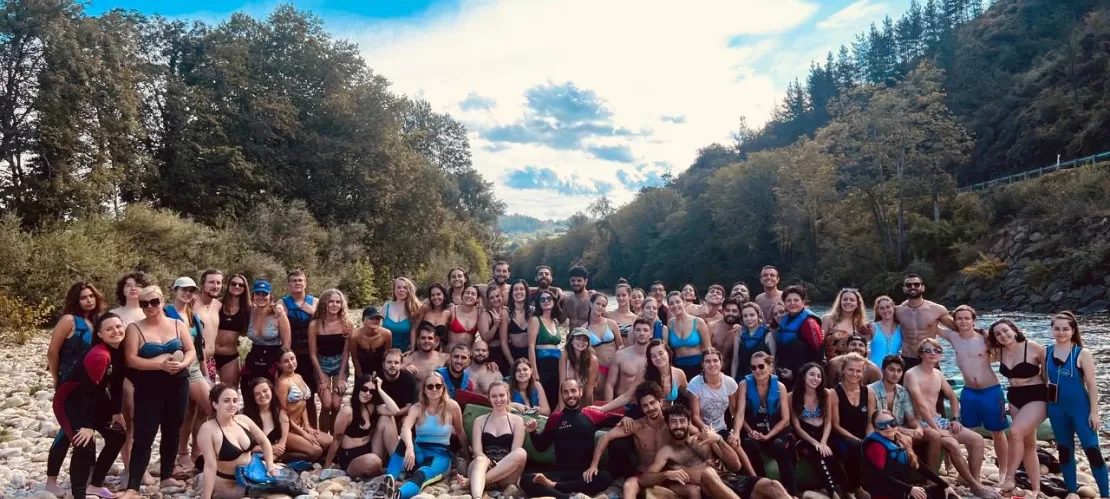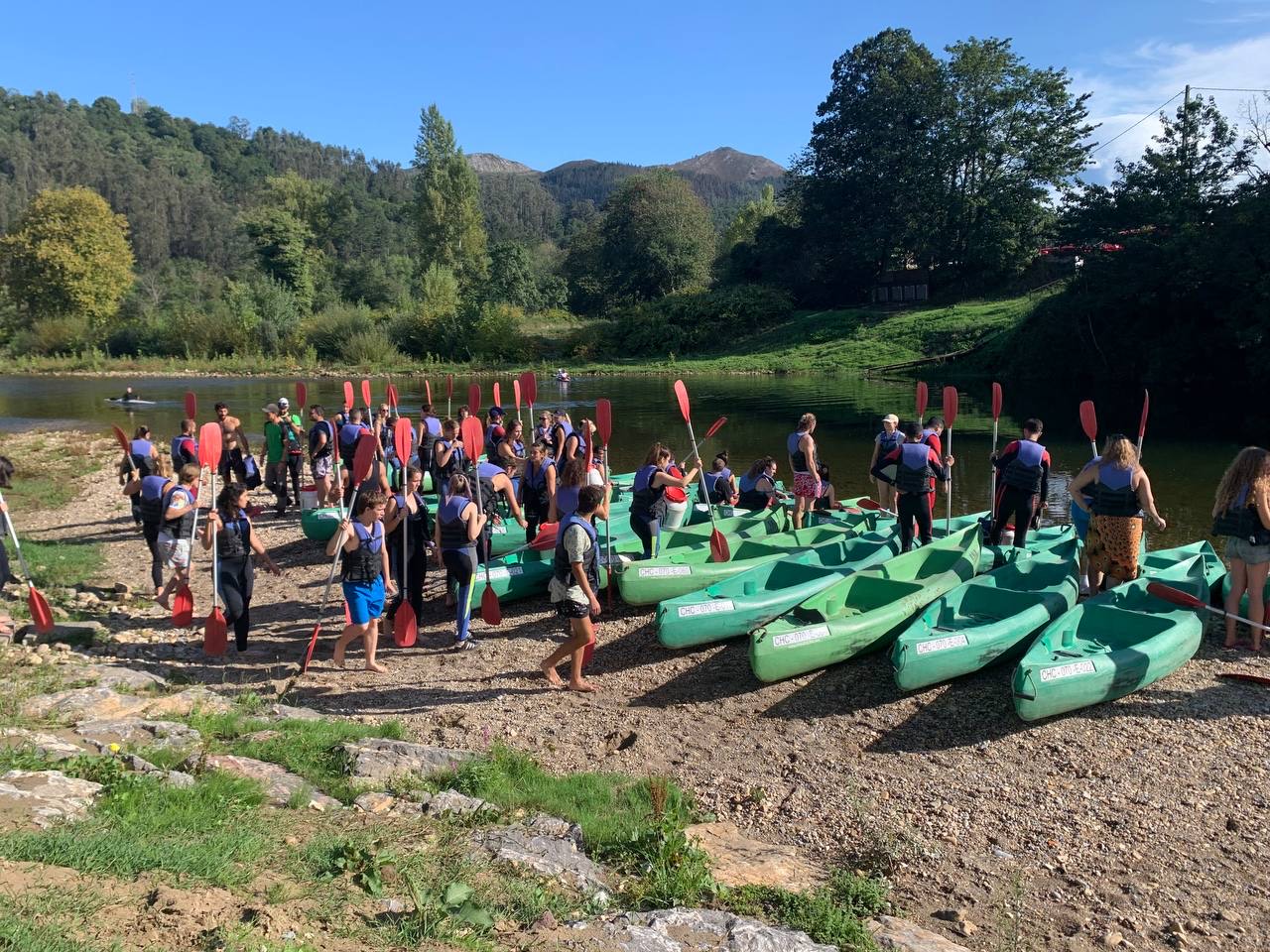
Hello everyone! My name is Halis Berk, and I was a participant in the We Are Europe, an Erasmus Training Course that took place in Oviedo, Spain from September 13th to 21st.
Let's explore this project process together…

What is the KA153 Training Course?
It refers to mobilities at the national and international levels where non-formal education methods are applied, involving youth workers from multiple countries. Training courses are excellent seven or ten-day-long programmes in which you can learn a lot about a specific topic while making dozens of new friends from different cultures.
Training courses are open to everyone because there is no age limit. Also, young individuals outside the 18-30 age range can participate in training courses. Compared to youth exchanges, these courses are more intensive and instructive, focusing on a specific topic. It is the type of project where most of the participants are workers within the youth field.
Let's start the journey to Spain
It was a long but enjoyable journey; The region of Oviedo, located in the northern part of Spain, is nestled amidst nature, close to the Atlantic Ocean. Our training course took place in a hotel up in the mountains, a little distant from the centre of Oviedo (believe me, transportation was no piece of cake).
Nine days in the heart of nature...
The training course had 36 participants from 12 different countries. We all gathered in Oviedo on September 13th. How did I start my journey? From İstanbul to Madrid, I took a flight that lasted about five hours. After landing in Madrid, I spent another five hours travelling by bus to Oviedo. Then, I took a 2-hour long taxi drive from the city centre to the project area. Yes, it was a total of 12 hours (fun and exhausting 12 hours).
Are transportation, meals, and accommodation covered?
As the training courses are projects supported by the European Commission within the scope of Erasmus+, your accommodation, meals and transportation costs are covered. In the We Are Europe project, our accommodation was a hotel in the mountainous area of Oviedo. Although the lack of internet and connection with the outside world was a disadvantage, it was actually a chance for us to have peaceful moments.
The meals weren't particularly good. Especially as a Turkish person, we didn't have many chances to eat food that suited our taste. However, we were not at the point of starving. The presence of both vegetarian and meat menus increased our meal options. In Erasmus projects, participants initially buy their tickets out of their pocket and then, after the project, they submit them to the coordinating organisation to receive a refund up to a certain limit (for example, up to 360 euros for Turkey-Spain).
What was the atmosphere like in the project?
YAY!! The most special and beautiful part is creating a cultural innovation with the opportunity to meet and socialise in a different environment with dozens of people from numerous nations. There was a wonderful atmosphere, with 36 participants from 12 different countries. So I am very happy to have made 36 new friends.
At the same time, there was another project from the coordinating institution in the area. The YERA Youth Exchange project was also held on the same dates as our training course, with 36 participants from 4 other countries, meaning that a total of 72 new participants made the 9 days excellent.
What was the subject of the training course, and how were the activities conducted?
During the training course, we applied non-formal education methods to create a more active and instructive system for the participants. Especially enriched with presentations, workshops, debates and simulations, the We Are Europe project was a highly instructive and intensive process for me.
The general topics of our project aimed to bring politics closer to the community, provide information and discussion on the institutions of the European Union as well as develop critical thinking skills. I must say that I have developed myself significantly in the post-project process and have gained a wealth of knowledge and experience.
The most special moment for me in this project was undoubtedly the time spent at the Cultural Day on the Atlantic Ocean. Sea, sand, football, having fun... and more.

So, do you want to participate in this programme? What should you do?
First of all, you need to follow some social media accounts and various websites that publish European Union projects and apply for the project that suits your interests. Every young individual between the ages of 18-30 can benefit from the Erasmus programmes. Every programme supported by the European Union is completely free and open to young people.
For each project, an information package prepared by the coordinating institution is available. This information package includes everything about transportation, accommodation, project topic, etc. If the candidate participant reads this info pack and meets the necessary conditions, they should apply for the project. Calls for participants for each country are available on the social media channels or websites of the coordinating institution and project partners. You can be selected or invited for an interview after completing a form.
There are no requirements such as a university degree or proof of knowing a foreign language to participate in these projects. However, having an A2 English level allows you to benefit more from the programme, because it is the language of instruction. If you want to be actively involved in the stages of the project, you need to understand and speak English at an intermediate level.
What benefits do Erasmus+ projects bring to you?
Every project has a different story; 36 unforgettable and wonderful people... Yes, in an atmosphere where you wake up at sunrise every day, spending time together and working together creates a friendship bond between you and your peers. Becoming close friends with people in a short amount of time is one of the beauties of the Erasmus+ world. At this point, the most important thing Erasmus has brought me is lifelong friendships. Erasmus+ projects construct a very rich environment, especially as a network, in the educational and professional lives of the participants.
Additionally, participants gain cultural innovation in the project and develop an interest in foreign languages and different cultures. Thus, there is a significant difference in our overall experience before and after participating in this kind of project.
Do you receive a document that proves the qualifications you have gained in the project?
My answer to this question is... ABSOLUTELY YES! In every project supported by the European Union, you receive a Youthpass certificate that includes your learning outcomes. The Youthpass certificate consists of 8 key competencies (foreign language, mother tongue, cultural, digital, etc.), showing your qualifications in these areas. Youthpass not only provides an advantage to students who want to do a master's or a doctorate in the European Union but also helps you gain many advantages in your future career.
Well, we're coming down the homestretch...
If you ask me amidst all this storytelling what the most difficult and heartbreaking moment in the project was, I would say it was the time when we parted ways. Parting with dozens of friends you spent time with; the memories and that wonderful project atmosphere... Unfortunately, every good thing must come to an end, but the material and spiritual experience that every Erasmus project brings to a person is crucial for personal development.
I strongly recommend that every young individual reaches out and participates in these programmes. My journey to Spain was one of the best among my projects this year. Unforgettable and fun nine days...
Now, it's your turn! Take care of yourself, and see you in future projects!
Written by: Halis Berk Abaşoğlu
